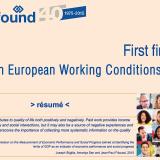EU context
Am 26. April 2017 führte die Kommission die europäische Säule sozialer Rechte ein. Das Paket umfasst eine Initiative zur Förderung der Vereinbarkeit von Beruf und Privatleben für Eltern und pflegende Angehörige. In der Initiative geht es um die Unterrepräsentation von Frauen auf dem Arbeitsmarkt und um eine Reihe von neuen oder verbesserten Mindeststandards für Eltern-/Vaterschaftsurlaub und Pflegefreistellungen.
Tätigkeiten von Eurofound
Datenerhebung
Die Europäischen Erhebungen zur Lebensqualität (EQLS) von Eurofound enthalten Vergleiche zwischen den Ländern zu den Themen Vereinbarkeit von Beruf und Familie, flexible Arbeitszeitregelungen und Bereitstellung guter Pflegedienstleistungen. Die Europäischen Unternehmenserhebungen (ECS) geben Aufschluss darüber, weshalb und wie Unternehmen von der Vielfalt an Arbeitszeitregelungen Gebrauch machen. Die Europäischen Erhebungen über die Arbeitsbedingungen (EWCS) untersuchen die Gestaltung der Arbeitszeit in der EU und damit im Zusammenhang stehende Themen, einschließlich flexibler Regelungen, Arbeitszeitpräferenzen und Vereinbarkeit von Beruf und Privatleben.
Die Europäische Beobachtungsstelle für das Arbeitsleben (EurWORK) bietet Informationen über Arbeitsbedingungen und nachhaltige Arbeit einschließlich einer Datenbank zu Löhnen, Arbeitszeiten und Tarifstreitigkeiten. Eurofound hat auch die wirtschaftlichen und sozialen Kosten der geschlechtsspezifischen Beschäftigungsunterschiede geschätzt und kann Informationen über Beschäftigungsmöglichkeiten im Bereich Pflegedienstleistungen bereitstellen.
Datenvisualisierung
Im Blickpunkt: Foundation Focus zu Lösungen für die Vereinbarkeit von Beruf und Privatleben
23. Dezember 2016 – In dieser Ausgabe von Foundation Focus wird die Vereinbarkeit von Beruf und Privatleben sowie einige der Faktoren, die sie fördern oder behindern, beleuchtet. Da sich die durchschnittliche Arbeitszeit kontinuierlich verringert, wird der Frage nachgegangen, ob die Vereinbarkeit von Beruf und Privatleben überhaupt noch ein aktuelles Thema ist. Wie kann die Arbeitszeitrichtlinie zur Vereinbarkeit beitragen und welche Rolle spielen Maßnahmen zur Flexibilisierung der Arbeitszeit? Welche spezielle Unterstützung benötigen Menschen mit Betreuungspflichten gegenüber Kindern oder erwachsenen Angehörigen? Die Vereinbarkeit von Beruf und Privatleben hängt auch mit bestimmten Aspekten aus anderen Lebensbereichen zusammen, wie etwa der Bedarf an hochwertigen Kinderbetreuungsangeboten, der Abbau der geschlechtsspezifischen Unterschiede in der Beschäftigung und Altersteilzeit-Angebote für ältere Beschäftigte, die nicht mehr in der Lage sind, Vollzeit zu arbeiten.
Work-Life-Balance: Lösungen, damit alle Familie und Beruf in Einklang bringen können






















